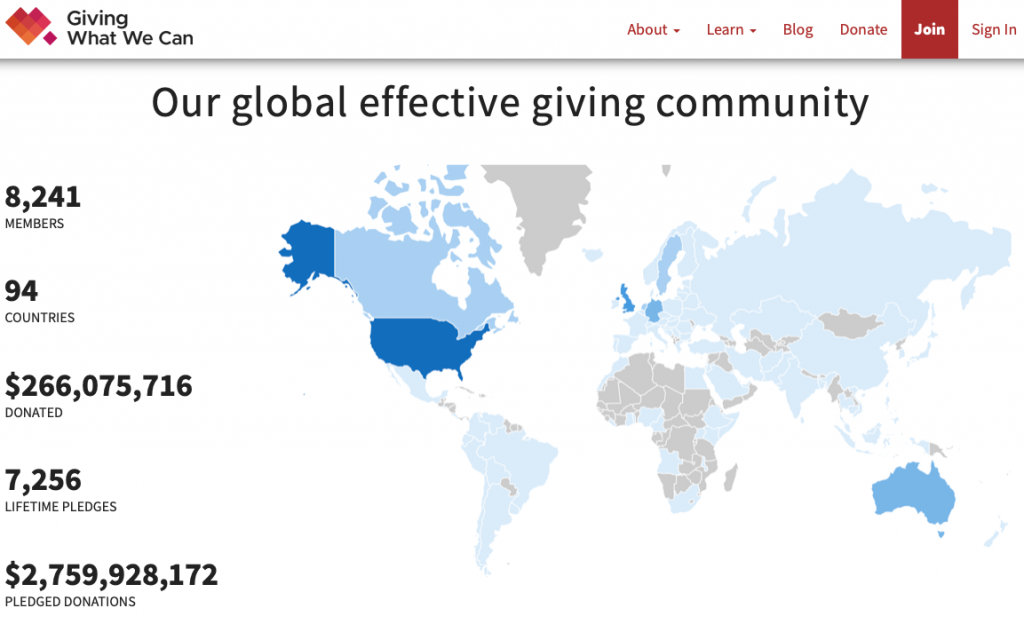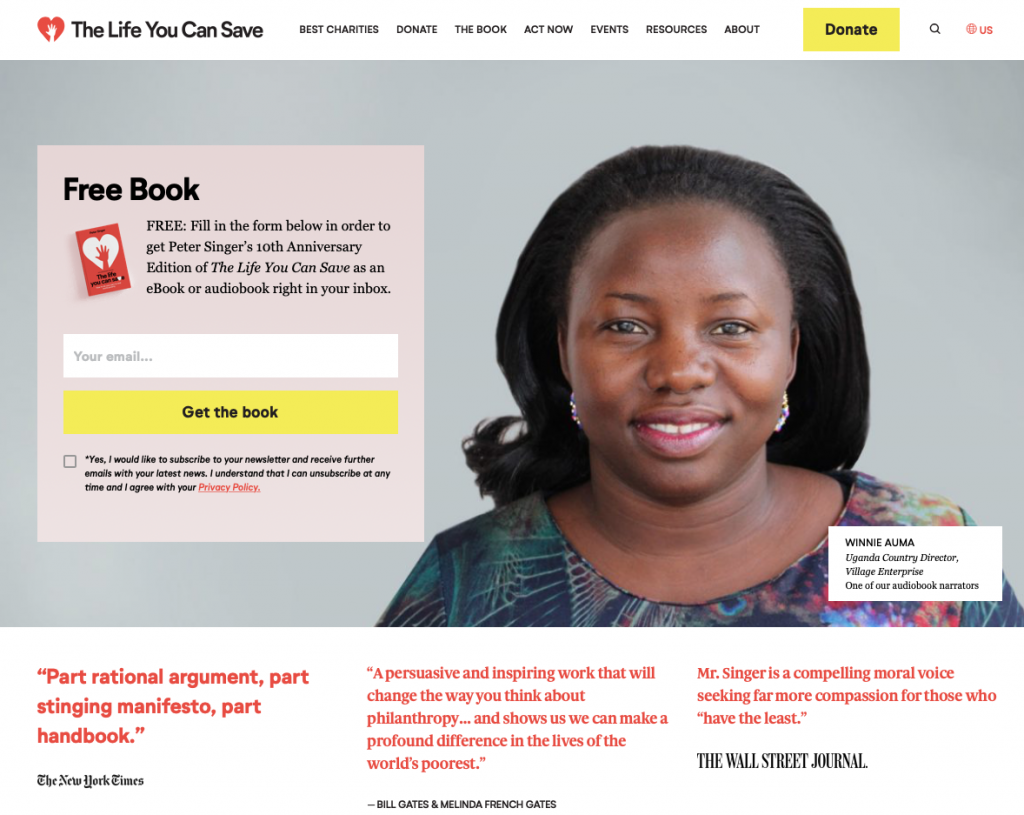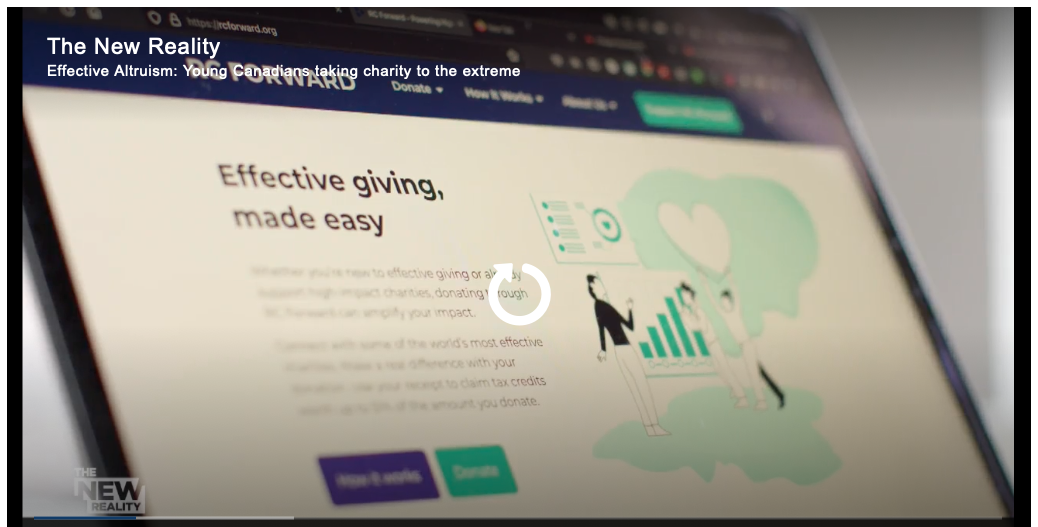The first in-depth, mainstream media coverage of the effective altruism movement in Canada
The virtuous few: How effective altruists are doing good better was just published as an in-depth article and video interview piece by Krista Hessey at Global News.
The article features Canadians, from students to retirees, who use effective altruist ideas to apply their resources to doing more good. These resources can be their education, their money, their careers, and in the case of Tony Peluso, even their kidney:
‘“[T]he decision to give away one of his organs wasn’t a difficult one. After reading Singer’s book, Peluso, 61, was sitting in his apartment in Ottawa thinking about all the ways he could possibly help people. “And I thought donating a kidney was kind of an easy one,” he says. “I thought, you know, ‘Oh yeah, I can do that.’”’
Several organizations were also featured, including Giving What We Can, 80,000 Hours, The Life You Can Save, and Charity Intelligence Canada, plus our very own platform, RC Forward.

Our team was also delighted to be featured in the piece and to contribute to it. To celebrate, this article connects you with resources on how to learn more about effective altruism and effective giving.
We also share some thoughts about the benefits of taking an incremental approach to doing more good with your charitable donations. An incremental approach is an alternative to feeling like you have to choose between high-impact giving or donating to a different cause that you love for other reasons.
Read free books to learn more about the effective altruism perspective on global health, longtermism, or using your career to do more good
Kevin Ulug felt compelled by the book The Life You Can Save, explaining, “The thing that really got across to me from Singer’s book was that whether or not we help others and whether we do so effectively is a really high stakes decision.”
You can download The Life You Can Save for free. The audiobook version has several narrators, including Kristen Bell and Stephen Fry. Visit this page to grab your copy.
Check out 80,000 Hours’ free book giveaway to learn more about longtermism or about applying effective altruist ideas to your career choices, Here are the books they are offering:
- The Precipice by Toby Ord
- Doing Good Better by Will MacAskill
- 80,000 Hours by Benjamin Todd
Visit this page to learn more about 80,000 Hours’ free book giveaway.

Explore Giving What We Can’s resources on giving more, and more effectively
The piece highlighted that effective altruism is about considering all of your resources that you’re able and willing to direct towards doing good. These resources can include time, skills, your connections, and your money. Charitable giving, as the piece points out, is far from the only important way to do good. But it is one way that is available to many of us.
If you’re curious about how to do more good with your donations, you might want to check out Giving What We Can, a global community of effective givers.
Here’s some Giving What We Can resources we recommend starting out with:
- Charity Evaluation: How to Find an Effective Charity
- Case Studies: People Who Pledge To Give
- Tax Deductibility – Canada
Consider an incremental approach to building impact into your donation decisions
Have you ever been discouraged from going plant-based because it was framed as an all-or-nothing choice? We like “Meat Me Halfway” because of the alternative framing it offers. Recognizing that “the path to going plant-based has obvious upsides, but can also be isolating and difficult,” Meat Me Halfway instead focuses on “creating more common ground at the dinner table,” by taking incremental changes.
The same can be said for high-impact giving. For some people, it makes sense or is even exciting to direct all of one’s donations based on impact and cost-effectiveness.
But we want to see a world where effective giving is mainstream and accessible to everyone. To get there, we think it’s important to respect that an individual may be trying to satisfy multiple values when they think about how to distribute their entire charitable budget.
Our “ask” is simply for you to consider whether impact is a value that you want to guide some of your donations. Then, to determine which of your donations you are able and willing to donate based on this value.
Says Julia Wise in You have more than one goal, and that’s fine:
“When you make a decision, be clear with yourself about which goals you’re pursuing. You don’t have to argue that your choice is the best way of improving the world if that isn’t actually the goal. It’s fine to support your local arts organization because their work gives you joy, because you want to be active in your community, or because they helped you and you want to reciprocate. If you also have a goal of improving the world as much as you can, decide how much time and money you want to allocate to that goal, and try to use that as effectively as you can.”
Remember, a great thing about high-impact giving is that it’s about doing more with less. Not all charities are equal, and some can be 10 or even 100 times as effective as others. As Kate Bahen from Charity Intelligence Canada explains in the Global News piece, “it’s not about how much money you have to give, it’s how you give.”
Thank you to everyone who contributed to the article!
We applaud all the folks in Canada who contributed to the article in interviews and behind the scenes. We think they did a great job sharing their personal journey with effective altruism.
Now that you’ve read about some of the kind and generous people in the article, you’ll get what a pleasure it is to be the team that supports Canadians that are taking action by supporting high-impact charities through RC Forward.
We support students and pensioners, people donating $10 and people donating $1 million. Our donors live in every Canadian province and territory except for Nunavut…so far.
Over 2,000 Canadians used RC Forward to make a high-impact donation in 2021. We hope you’ll consider joining us to make 2022 even better for the people and animals around the world who stand to benefit from your support of our partner charities and high-impact funds.
Check them out at https://rcforward.org/donate!

